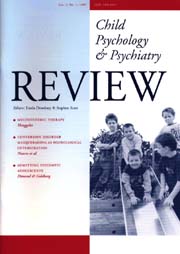Crossref Citations
This article has been cited by the following publications. This list is generated based on data provided by
Crossref.
Maliphant, Rodney
2000.
Quality and quantity demands in educational psychology: Strategic objectives for the 21st Century.
Educational and Child Psychology,
Vol. 17,
Issue. 2,
p.
16.
Yule, William
2002.
Selected Proceedings of the Second International Conference on Child & Adolescent Mental Health.
Vol. 2,
Issue. ,
p.
165.
Yule, William
2002.
Alleviating the effects of war and displacement on children..
Traumatology,
Vol. 8,
Issue. 3,
p.
160.
Vostanis, Panos
2003.
Impact of trauma on Palestinian children's mental health: lessons from the Gaza studies.
International Psychiatry,
Vol. 1,
Issue. 2,
p.
5.
Steil, Regina
2004.
Angststörungen bei Kindern und Jugendlichen.
p.
275.
Mobayed, Mamoun
2004.
Childhood trauma training in the West Bank and Gaza Strip: a field visit report.
Child Care in Practice,
Vol. 10,
Issue. 2,
p.
95.
Hlastala, Stefanie A.
and
McClellan, Jon
2005.
Phenomenology and Diagnostic Stability of Youths with Atypical Psychotic Symptoms.
Journal of Child and Adolescent Psychopharmacology,
Vol. 15,
Issue. 3,
p.
497.
MOORE, MELISA
and
RUSS, SANDRA W.
2006.
Pretend Play as a Resource for Children.
Journal of Developmental & Behavioral Pediatrics,
Vol. 27,
Issue. 3,
p.
237.
Lauterbach, Dean
and
Reiland, Sarah
2007.
Handbook of Exposure Therapies.
p.
127.
Toland, John
and
Boyle, Christopher
2008.
Applying Cognitive Behavioural Methods to Retrain Children's Attributions for Success and Failure in Learning.
School Psychology International,
Vol. 29,
Issue. 3,
p.
286.
Morsette, Aaron
Swaney, Gyda
Stolle, Darrell
Schuldberg, David
van den Pol, Richard
and
Young, Melissa
2009.
Cognitive Behavioral Intervention for Trauma in Schools (CBITS): School-based treatment on a rural American Indian reservation.
Journal of Behavior Therapy and Experimental Psychiatry,
Vol. 40,
Issue. 1,
p.
169.
Becker, Carol-Lynne J.
2015.
Integrating Art Into Group Treatment for Adults With Post-Traumatic Stress Disorder From Childhood Sexual Abuse: A Pilot Study.
Art Therapy,
Vol. 32,
Issue. 4,
p.
190.
Lloyd, Alex
and
Borrill, Jo
2020.
Examining the Effectiveness of Restorative Justice in Reducing Victims’ Post-Traumatic Stress.
Psychological Injury and Law,
Vol. 13,
Issue. 1,
p.
77.
Krisnanda, Veno Dwi
Ramli, M
and
Hidayah, Nur
2022.
Konseling Cognitive Behavioral Therapy (CBT) untuk Mengembangkan Self-love Penyintas Trauma Kekerasan Dalam Rumah Tangga (KDRT).
Counsellia: Jurnal Bimbingan dan Konseling,
Vol. 12,
Issue. 2,
p.
116.


